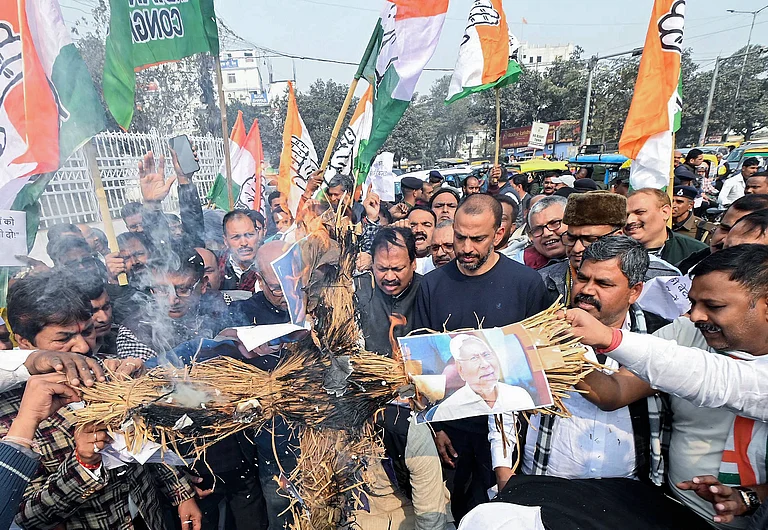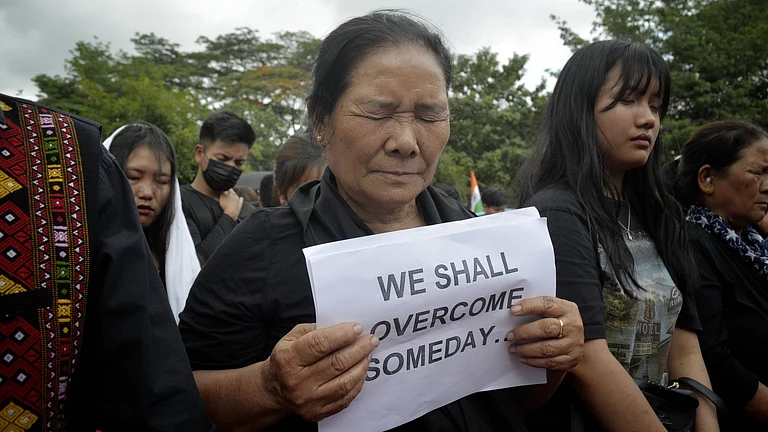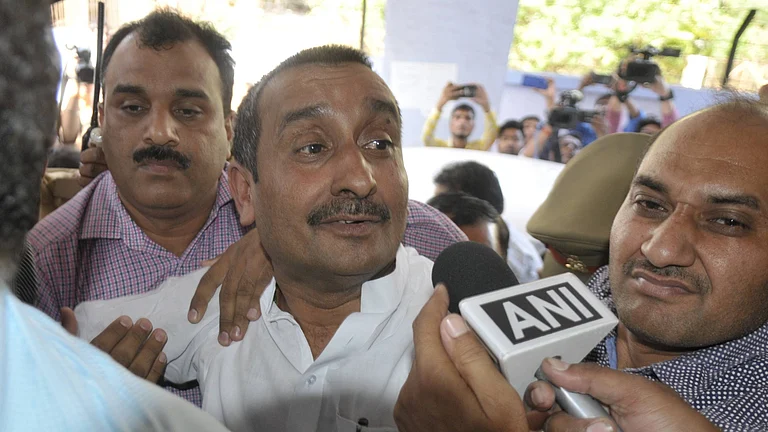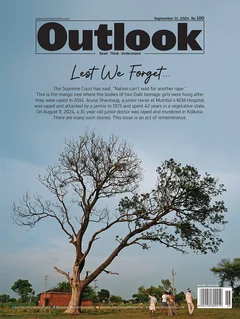This is the cover story for Outlook's 11 September 2024 magazine issue 'Lest We Forget'. To read more stories from the issue, click here
It was a chilly winter evening in Delhi. A physiotherapy intern had gone to watch the movie ‘Life of Pi’ with her friend at PVR Select City Walk in Saket on December 16, 2012. By the time they left the theatre, it was past 9 pm. They were waiting at the Munirka bus stand to take the next bus home to Dwarka. When an off-duty chartered bus stopped there and offered them a ride, they did not realise it was a private bus. What happened next left the country in shock.
There were six male occupants on the bus, drunk. After covering some distance, the bus took a different route, making the woman and her friend suspicious. The friend tried to inquire and got into a scuffle with the group. They knocked him down using an iron rod, then dragged her to the back of the bus and gang-raped her while the bus travelled all over Delhi. When she protested, they beat her and shoved an iron rod into her private parts. After a while, the couple were thrown out of the moving bus, naked and bleeding. After her death, she was named Nirbhaya—the one without fear.
When the incident happened, Seema Samridhi Kushwaha was a law trainee preparing for the Union Public Service Commission (UPSC) exam. She used to stay as a paying guest in Delhi. After the news broke, she saw several bags packed, as her flatmates were called and persuaded by their families to move back home because it was no longer “safe” for women to live in Delhi. But she continued to stay in the city.
“It unnerved me. It reminded me of my childhood when a panchayat was held in my village to decide whether I should be allowed to go to another district to study beyond class 8. That day, I made a promise to myself to fight for Nirbhaya and for all women of this country,” she says.
Kushwaha left her UPSC exam preparations and devoted her life to fighting crimes against women. Initially, she was involved in the protests and also went to the court hearings in Nirbhaya’s case. In 2014, she officially became the lawyer of Nirbhaya’s mother. Recalling her first interaction with the victim’s parents, she says, “The first time I met her parents, they had no idea about court cases—they just wanted justice for their daughter. I developed an emotional bond with them. In a way, I became their daughter. It was as if I was fighting for my sister. I promised them that I would do what it takes to get justice.”
There were six people accused—Ram Singh, the bus driver who died in prison in 2013 allegedly by suicide, Mukesh Singh, Vinay Sharma, Pawan Gupta, Akshay Thakur and a minor. Four of the convicts, barring Ram Singh, were awarded death sentences. The minor was sentenced to three years in a correctional home by the Juvenile Justice Board.
Kushwaha says that getting the death penalty for the convicts was of utmost importance to her. However, the journey to their execution was a long and gruelling wait that they had not anticipated. “I realised I was not only fighting the defence, but also the system. In India, laws favour the accused more than the victims. So, even after the death penalty was awarded, the loopholes delayed the process till their execution,” says Kushwaha.
***
Among the prominent faces of the Nirbhaya movement in Delhi was Yogita Bhayana, who left her aviation career to become an activist. “During the protests over the Nirbhaya case, there were many challenges, but the biggest, which exists even today, is the mindset and inaction of the State. Saying ‘hang the rapists’ is not enough until you actually hang the rapists,” she says.
A Nirbhaya Fund was set up in 2013. But 30 per cent of the Rs 6,000 crore corpus remained unused, the Lok Sabha was told in 2022.
In 2013, several changes were made in the Criminal Law (Amendment) Act to include harsher punishment for rape and sexual crimes and to fast-track the investigative procedures. The Justice J S Verma Committee was constituted and made several recommendations to curb rape, including increased punishment for rapists who cause the death of a victim or inflict serious injuries, with not less than 20 years of imprisonment. However, the committee recommended against the death penalty even in the ‘rarest of rare’ cases. Despite the amendments, however, a total of 445,256 cases of crimes against women were registered across India in 2022, according to the National Crime Records Bureau (NCRB), which is nearly 51 First Information Reports (FIRs) every hour.
Following the Nirbhaya case, Bhayana also launched a pressure group called the People Against Rapes in India (PARI). “Every single day we get cases that give us the jitters. These incidents are more common than people think,” she says, adding that these cases are the responsibility of the State. “We are taking them because nobody else cares.”
A Nirbhaya Fund was set up in 2013 by the United Progressive Alliance (UPA-II) government with an initial corpus of Rs 1,000 crore to focus on implementing initiatives that are aimed at improving the security and safety of women. However, an Oxfam India report found in 2021 that the funds earmarked for setting up helplines, opening crisis centres and introducing gender sensitisation training was underspent. In 2022, the Lok Sabha was told that 30 per cent of the Rs 6,000 crore corpus remained unused.
“While we can really utilise the money to curtail sexual violence cases, the government is only interested in playing politics. There is no accountability towards these cases. Nothing is being done to make the women and children feel safer,” says Bhayana.
The 2012 Delhi gang rape was nothing short of barbaric and reflective of a systematic failure to cleanse the societal malaise. The details of injuries on her head and intestines were so gruesome that the capital city was shaking with outrage. A volley of angry protestors circled police stations and blocked highways seeking punishment to the rapists and accountability from the State. Dharnas were held at India Gate, Jantar Mantar and Raisina Hill in the biting cold of Delhi’s winter, where teargas shells and water cannons were used to disperse the protestors. Heated debates and uproar went on in Parliament. As more cases of rape and sexual assault in Delhi came to light, the capital was inauspiciously termed the ‘rape capital of India’.
MORE FROM THIS ISSUE
The case went on for nearly eight years. Kushwaha, who fought for it till the end, says: “Every time I read the chargesheet, I had tears in my eyes. It could have been me or anyone else that day. I had a responsibility towards her and for every woman in this country.” The four men convicted of Nirbhaya’s rape and murder were executed at 5:30 am on March 20, 2020, in gallows specially designed for them. “The day the accused were hanged, aunty gave me Nirbhaya’s bangle as a keepsake. I wear it every time I have a hearing,” says Kushwaha. “No matter how many laws are enacted, until there is time-bound investigation and a fast-track trial and appeal system, it does not make a difference. We will not see any change until fear is instilled in the perpetrators,” says Kushwaha.
(This appeared in the print as 'She Must Have Been Afraid')


































